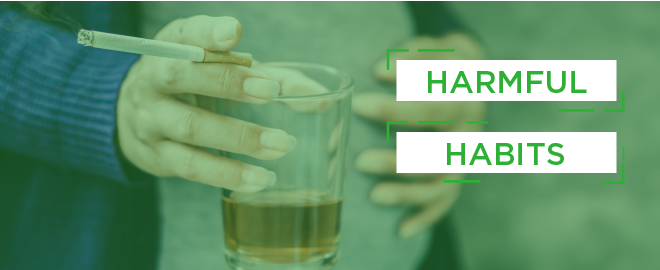How smoking and alcohol harm your oral health
Posted on February 1, 2024 in Healthy You

As we welcome a new year, many of us hope for a fresh start with resolutions geared toward better health and wellness. Two major barriers to a healthy life are smoking and excessive alcohol consumption, both of which significantly impact your oral health. Here, we’ll review the harmful effects these habits have on your smile. This knowledge can be a powerful motivator to break free from them and embrace a healthier you.
Smoking’s effect on your oral health
Most people already know that smoking is a major health risk. Although your lungs are most associated with its harmful effects, smoking also wreaks havoc on your mouth. Here are some main ways smoking threatens your good oral health:
- Weakened teeth and gums: Tobacco products contain toxins that weaken your teeth and gums, leading to cavities and gum disease. When these conditions are left untreated, they can cause a lot of problems, including tooth loss.
- Higher risk of oral cancer: Smoking is one of the most established risk factors for oral cancer.
- Stained teeth: Cigarettes and other tobacco products contain tar and nicotine, which can stain your teeth a brown or yellowish color.
- Bad breath: Smoking causes bad breath. Although good oral hygiene and mouthwash use may help control it, continued smoking will ensure bad breath lingers.
Excessive alcohol use and oral health
Moderate drinking — one daily serving of alcohol for a woman and two daily servings for a man — can be part of a healthy lifestyle. But when your alcohol consumption is more than that, it causes problems. Here’s how excessive drinking can hurt your teeth and mouth:
- Dry mouth: Alcohol dehydrates your mouth, which leads to less saliva. Saliva not only keeps your mouth feeling comfortable, but it also plays an important role in washing away food particles from your teeth and gums and preventing the growth of bacteria that can lead to cavities and gum disease.
- Higher risk of oral cancer: Similar to smoking, excessive alcohol consumption has long been linked to greater risk for developing oral cancer.
- Increased acidity and sugar: Alcohol increases the acidity in your mouth, which can wear down your enamel (the outer layer of your teeth). When your enamel breaks down, it cannot grow back, and eroded enamel can lead to painful tooth sensitivity and cavities. Alcohol also contains varying levels of sugar, which feed the bacteria of your mouth that cause cavities.
- Boosts infection risk: Alcohol weakens your immune system, making it harder to fight off infections in the mouth, including gum disease.
Cutting bad habits goes beyond your smile
Quitting your smoking habit and cutting back on alcohol will improve not just your oral health but your overall health as well. The health of your teeth and mouth is linked to your total-body health — when you have an infection in your mouth it can cause problems elsewhere in your body and vice versa. Start the new year with a brighter smile and a renewed commitment to your health by making smoking and excessive alcohol use a thing of the past.
SOURCES:
Oral Health Foundation
Centers for Disease Control and Prevention
Penn Dental Medicine